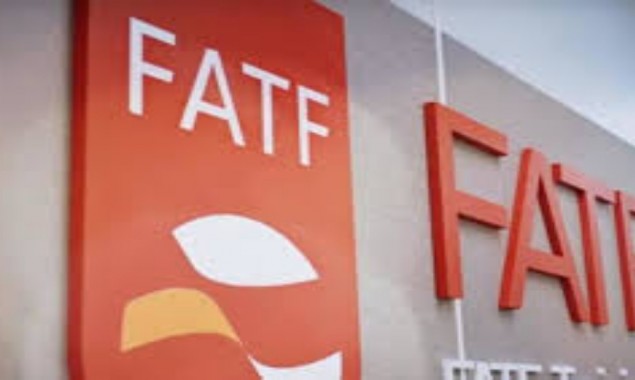
Pakistan should act against UN-designated terror groups to get out of FATF grey list: experts. Image: File
LAHORE: Despite the continuous efforts of Prime Minister Imran Khan-led Pakistan Tehreek-e-Insaf (PTI) government to get Pakistan out of the Financial Action Task Force (FATF) grey list, the global money-laundering watchdog announced the otherwise on Thursday.
Announcing the decision after a five-day virtual plenary session on October 21, FATF head Marcus Pleyer said that Islamabad has “addressed or largely addressed” a majority of the watchdog’s conditions but that it has to complete two concurrent action plans with a total of 34 items.
The member states reviewed Pakistan’s compliance considering both action plans were agreed by Islamabad in June 2018 and February 2021. FATF president, although, lauded Pakistan’s overall performance. However, the member states decided to keep Pakistan on the list of jurisdictions under the increased monitoring till February 2022.
High court advocate Abdul Rauf Shakoori, an expert on matters related to anti-money laundering and Countering Financial Terrorism (AML/CFT), told Bol News that “if we look at our [Pakistan] progress based on the recent consolidated rating assigned to us in the third follow-up report, Pakistan was fully compliant on eight recommendations, partially compliant on three with moderate shortcomings, largely compliant on 27 with minor shortcomings, and non-compliant on two recommendations with major shortcomings respectively.”
“Though Pakistan’s effectiveness measures were rated on a scale of the high, substantial, medium, and low levels of effectiveness based on 11 immediate outcomes (IOs), our levels of effectiveness were rated low on ten and medium for one immediate outcome (IOs), which relates to international cooperation,” he added.
Shakoori maintained that Pakistan made good progress in addressing the technical compliance deficiencies identified in its MER 2019 and was re-rated on R.10, R.18, R.26, and R.34. Recommendation 10 was re-rated to “compliant”, and R.18, R.26, and R.34 to “largely compliant”.
The lawyer believes that Pakistan’s compliance related to counter-terrorism financing is not up to international standards.
Therefore, Shakoori continued, FATF again demanded action from Pakistan to demonstrate TF investigations and prosecutions of target senior leaders and commanders of UN-designated terrorist groups. He stressed that Pakistan should continue working to address critical deficiencies in the AML/CFT framework specifically.
The way forward for Pakistan
Dr Ikramul Haq, a leading tax consultant and co-author of ‘Pakistan Tackling FATF: Challenges and Solutions” said: “The challenge for Pakistan now will be to act against senior leaders and commanders of UN-designated terrorist groups about which world warned us in 2016, and shared the consequences of not addressing strategic deficiencies, especially relating to combating the financing of terrorism (CFT).”
In response to the FATF warning, former premier Nawaz Sharif had directed the security agencies to take stern actions against rogue elements or else Pakistan would face global isolation. This very warning was not appreciated by the agencies, and the assignment of tasks allegedly resulted in discord between the government and the military leadership, he recalled.
Given the previous episode of civil-military relations on this issue, the current situation is comparatively different. Though civil and military leaderships have been on the same page since 2018, however, there was no significant progress made by Pakistan on this issue.
Dr Haq maintained that now, Pakistan was specifically asked to address the issues related to terrorist financing and action against the senior commanders of UN-designated personnel.
“Now, we have to see what our strategy is. The strict compliance might get us out of the grey list hopefully by June 2022. Otherwise, we will continue to face this embarrassment.”
For Dr Haq, another factor, which needs to be considered, is that though Pakistan’s progress on technical compliance has improved, its effectiveness is not satisfactory.
“Our temporary arrangements might help us for short terms, and we should be placed on the whitelist next year. However, in the long run, it will not help us. Naming Turkey in a grey list is a classic example of a weak AML/CFT framework which ultimately put the country back as a non-cooperative state.”
“We have to change our priorities and streamline the legal framework. Our issues about AML–CFT cannot be addressed without incorporating the fundamental principles of countering the illicit flow of funds in our legislation,” he continued.
According to Dr Haq, Pakistan has to address the questionable provision of the Amended AML act to meet international best practices. Similarly, various regulations issued by the State Bank, the Securities and Exchange Commission of Pakistan, and the Federal Board of Revenue do not address most issues.
Additionally, Pakistan now needs to comply with sanctions regimes and should take strict actions under the United Nations Security Council resolutions (UNSCR resolutions) relating to the prevention and suppression of terrorist financing including, a freeze of assets of designated individuals, without delay. “We have to make sure that the funds and assets are not available, directly or indirectly, to or for the benefit of, any person or entity designated by the UNSCR.”
Dr Haq suggested that this exercise requires revamping Pakistan’s entire system about financial institutions, money services businesses, actions against alternative remittance systems (hundi and hawala) including, implementation of travel rules etc. These actions, he added, will save Pakistan from continuous embarrassment and restore our respect at the global index.
Recently, Pakistan took multiple steps to add quality to its AML/CFT regime. New legislative amendments have been enacted, and the FATF also had acknowledged that since June 2018, Pakistan has made significant progress and has completed 26 of the 27 action items in its 2018 action plan. Earlier in June this year, Pakistan extended a further high-level commitment to address these strategic deficiencies according to a new action plan that primarily focused on combating money laundering.
Now in the October hybrid meeting, FATF has once again stressed Pakistan to make progress to demonstrate that TF investigations and prosecutions target senior leaders and commanders of UN-designated terrorist groups, and should continue to work to address critical deficiencies in the AML/CFT framework namely by; providing evidence that it actively seeks to enhance the impact of sanctions beyond its jurisdiction by nominating additional individuals and entities for designation at the UN; and by demonstrating an increase in ML investigations and prosecutions and that proceeds of crime continue to be restrained and confiscated in line with Pakistan’s risk profile, including working with foreign counterparts to trace, freeze, and confiscate assets.
Pakistan was the first greylisted by the FATF in 2008 for a brief period but quickly came out of it. The greylisting happened again in 2012, and this time stayed until 2015. The decision was made based on a FATF 2012 report that recommended controlling the financial flow to terrorist organisations with its Asia Pacific Group to deal with the countries of this region. Pakistan was suspected to be one of the countries where strict anti-money laundering and counter-terrorist financing measures were to be taken based on the 2012 FATF recommendations.
However, perhaps the current greylisting was done in June 2018 because Pakistan was only given 15 months to implement the terms of the FATF action plan.
Therefore, in October 2018, the world financial watchdog put in place a formidable group of financial, legal and law enforcement experts from nine countries/organisations, including Maldives, Indonesia, China, the UK, the US, Turkey, New Zealand, Australia, and IMF to evaluate Pakistan’s case.
The argument since then has been that the countries chosen to look into the Pakistan case are hostile to Islamabad. However, this is grasping at straws, especially since the data and information used to make the judgement to these countries, was provided by Pakistan, and gathered physically by experts making on-site visits also. The document came to be known as the Mutually Evaluated Report (MER).
Read More News On
Catch all the Pakistan News, Breaking News Event and Latest News Updates on The BOL News
Download The BOL News App to get the Daily News Update & Follow us on Google News.




